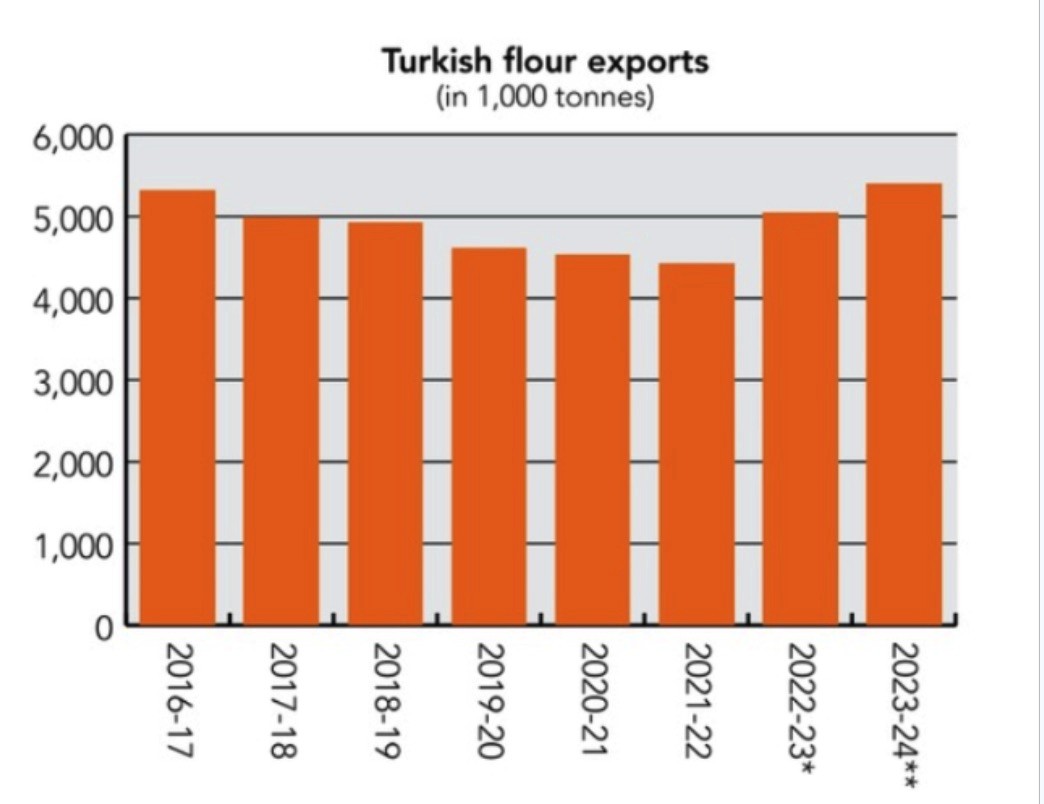Wheat Flour Export from Turkey: Everything You Need to Know
Comprehensive Insights into Turkey's Flour Export Industry
Turkey's Flour Export Industry
Turkey stands as a significant player in the global flour market, thanks to its strategic geographical location, fertile lands, and favorable climate conditions. These factors contribute to the production of high-quality wheat, making Turkey one of the leading flour exporters worldwide. This blog post provides an in-depth look into flour export from Turkey, covering production processes, export procedures, target markets, competitive landscape, logistics, international trade regulations, and effective marketing strategies.
Flour Production and Quality in Turkey
Turkey’s Flour Production Capacity and Annual Production Volume
Turkey’s flour production capacity is substantial, with an annual production volume of approximately 22 million metric tons. This high output is supported by more than 500 milling companies operating within the country. The advanced milling technology and infrastructure in Turkey ensure the production of various types of flour, including all-purpose, bread, pastry, and specialty flours, catering to both domestic and international markets.

Global Recognition and Market Position of Turkish Flour
Turkish flour is globally recognized for its superior quality. The meticulous selection of high-quality wheat and the implementation of state-of-the-art milling processes ensure that Turkish flour meets the strict standards required by international markets. Turkey is the world's top flour exporter, with its products being well-received in over 160 countries.
Quality Standards and Certification Processes
To maintain its high standards, Turkish flour producers adhere to rigorous quality control measures. Key certifications that underscore the quality and safety of Turkish flour include:
ISO 22000: Food Safety Management
ISO 9001: Quality Management System
HACCP: Hazard Analysis and Critical Control Points
Halal Certification: Ensuring products meet Islamic dietary laws
These certifications are critical in ensuring that Turkish flour products meet the stringent international standards and regulations.
Flour Export Process in Turkey
Legal Procedures and Permits Required for Export
Exporting flour from Turkey involves navigating several legal procedures and obtaining necessary permits. Key steps include:
Export Registration: Companies must register as exporters with the Turkish Exporters Assembly.
Export License: An export license is required, which can be obtained from the Ministry of Trade.
Health Certificates: These are issued by the Ministry of Agriculture and Forestry to ensure the flour meets health standards.
Customs Declaration: Exporters must complete customs declarations and provide documentation such as invoices, packing lists, and certificates of origin.
Quality and Packaging Standards
Turkish flour exporters must adhere to strict quality and packaging standards to meet international requirements. Common packaging options include:
25 kg and 50 kg polypropylene (PP) bags: Durable and moisture-resistant, suitable for long-distance shipping.
Custom Packaging: For bulk orders and private labels, tailored packaging solutions can be provided.
Customs Procedures and Logistics Details
Efficient customs procedures and logistics are vital for the successful export of flour. Exporters must ensure:
Accurate Documentation: Properly completed export documents to avoid delays.
Compliance with Import Regulations: Adhering to the import regulations of the destination country.
Reliable Logistics Partners: Collaborating with trusted shipping companies to ensure timely and safe delivery.
Target Markets
Major Countries that Import Turkish Flour
Turkey exports flour to numerous countries across different regions. Major importers include:
South America: Brazil, Argentina
MENA (Middle East and North Africa) Region: Qatar, Saudi Arabia, UAE
Asia: Thailand, Myanmar, Indonesia, Malaysia
Africa: Ghana, Somalia, Djibouti, South Africa, Ethiopia
Needs and Expectations of Target Markets
Each target market has specific needs and expectations regarding flour quality, types, and packaging. Exporters must tailor their products to meet these demands. For instance:
Middle East and Africa: High demand for bread flour and all-purpose flour.
Asia: Preference for specialty flours used in noodles and pastries.
South America: Diverse needs ranging from bread flour to pastry flour.
Criteria for Market Research and Target Market Selection
Effective market research involves analyzing several factors, including:
Market Size and Growth Potential: Understanding the volume and growth trends in target markets.
Regulatory Environment: Compliance with local import regulations and standards.
Logistical Feasibility: Assessing transportation options and costs.
Competitive Landscape: Identifying key competitors and market entry barriers.
Competitive Analysis
Competitor Countries in the Flour Export Market
Turkey faces competition from several major flour-exporting countries, including:
United States: Known for its high-quality wheat and advanced milling technology.
Canada: Renowned for its durum wheat, used in pasta production.
European Union: Countries like Germany and France are strong competitors with robust milling industries.
Advantages and Disadvantages of Turkish Flour Compared to Competitors
Advantages:
Quality: Turkish flour is highly regarded for its consistency and quality.
Geographical Proximity: Strategic location offers logistical advantages, particularly to MENA and European markets.
Cost-Effectiveness: Competitive pricing due to efficient production processes and lower labor costs.
Disadvantages:
Fluctuating Wheat Prices: Volatility in global wheat prices can impact production costs.
Logistics and Transportation
Main Logistics and Transportation Methods
The primary logistics and transportation methods for exporting flour include:
Sea Freight: The most common method for bulk shipments, offering cost-effective transportation over long distances.
Road Transport: Used for regional exports, particularly to neighboring countries.
Key Considerations During Transportation
Maintaining optimal conditions during transportation is crucial to preserving flour quality. Key considerations include:
Temperature and Humidity Control: Ensuring that flour is stored in a cool, dry environment to prevent spoilage.
Secure Packaging: Using durable packaging to protect the flour from contamination and damage.
Storage and Shipping Processes
Effective storage and shipping processes are essential to maintaining the integrity of the flour. Best practices include:
Proper Handling: Ensuring careful handling during loading and unloading to prevent damage.
Regular Quality Checks: Conducting inspections at various stages to ensure product quality.
International Trade and Regulations
International Trade Agreements and Regulations
Exporters must be aware of various international trade agreements and regulations, such as:
World Trade Organization (WTO) Agreements: Governing international trade practices and tariffs.
Free Trade Agreements (FTAs): Reducing trade barriers between Turkey and partner countries.
Sanitary and Phytosanitary (SPS) Measures: Ensuring that exported flour meets the health and safety standards of the destination country.
Import Regulations and Customs Tariffs
Understanding the import regulations and customs tariffs of target countries is essential. Key aspects include:
Tariff Rates: Knowing the applicable customs duties and tariffs in the destination market.
Documentation Requirements: Ensuring all necessary documents are completed accurately to avoid delays and penalties.
Commercial Invoice: Detailed list of goods, including quantity, description, unit price, and total price.
Packing List: Breakdown of shipment contents, including type, number of packages, weight, and dimensions.
Bill of Lading (B/L): Issued by the carrier, detailing the type, quantity, and destination of the goods.
Certificate of Origin: Certifies that the goods were produced in Turkey.
Health Certificate: Ensures the flour meets health and safety standards, issued by the Ministry of Agriculture and Forestry.
Export License: Government-issued document granting permission to export goods.
Phytosanitary Certificate: Certifies that the goods are free from pests and diseases.
Insurance Certificate: Proof of insurance coverage for the shipment.
Customs Declaration Form: Provides details about the goods being exported.
Import License: Required by some countries for specific goods.
Regulatory Compliance: Adhering to local standards and regulations for food safety and quality.
Handling Commercial Disputes
In case of commercial disputes, exporters should be prepared with resolution strategies, such as:
Arbitration: Seeking resolution through arbitration processes to settle disputes out of court.
Legal Counsel: Engaging legal experts to navigate complex trade laws and protect business interests.
Marketing and Customer Relations
Effective Communication and Relationship Management
Building strong relationships with international customers is crucial for successful exporting. Key practices include:
Regular Communication: Maintaining consistent and transparent communication with buyers.
Responsive Customer Service: Providing prompt and effective support to address customer inquiries and issues.
Cultural Sensitivity: Understanding and respecting cultural differences to build trust and rapport.
Marketing Strategies and Digital Marketing Channels
Effective marketing strategies involve leveraging digital channels to reach a broader audience.
Key approaches include:
Social Media Marketing: Using platforms like LinkedIn, Facebook, and Instagram to promote products and engage with potential buyers.
Content Marketing: Creating informative and engaging content, such as blog posts, videos, and infographics, to highlight the benefits of Turkish flour.
Online Marketplaces: Listing products on international e-commerce platforms to increase visibility and access new markets.
Branding and Promoting Turkish Flour Abroad
Strong branding and promotional activities are essential for distinguishing Turkish flour in competitive markets. Strategies include:
Highlighting Quality and Certifications: Emphasizing the high standards and certifications that Turkish flour meets.
Participating in Trade Shows: Showcasing products at international trade fairs and exhibitions to connect with potential buyers.
Case Studies
Success Stories and Strategies of Successful Turkish Flour Exporters
Examining the success stories of other Turkish flour exporters provides valuable insights and strategies. For instance:
Expanding into New Markets: Successful exporters often diversify their target markets to mitigate risks and capitalize on new opportunities.
Investing in Technology: Leveraging advanced milling technology and quality control systems to produce superior flour.
Building Strong Customer Relationships: Fostering long-term partnerships with buyers through excellent service and consistent product quality.
Challenges Faced and Methods to Overcome Them
Exporters often face challenges such as fluctuating market demands, regulatory changes, and logistical hurdles. Addressing these challenges involves:
Strategic Planning: Developing comprehensive export plans that account for potential risks and market dynamics.
Adaptability: Being flexible and responsive to changing market conditions and customer needs.
Proactive Problem-Solving: Anticipating and addressing issues before they escalate to ensure smooth operations.
Conclusion
Turkey's position as a leading flour exporter is underpinned by its high-quality production, strategic location, and robust milling industry. Exporting flour from Turkey involves navigating complex processes, understanding target markets, and effectively managing logistics and customer relationships. By adhering to quality standards, complying with international regulations, and implementing strong marketing strategies, Turkish exporters can successfully tap into global markets.
About Eflani FlourEflani Flour exemplifies the quality and reliability of Turkish flour producers. With its advanced milling facilities, stringent quality control processes, and commitment to customer satisfaction, Eflani Flour has established itself as a trusted name in the international flour market.


